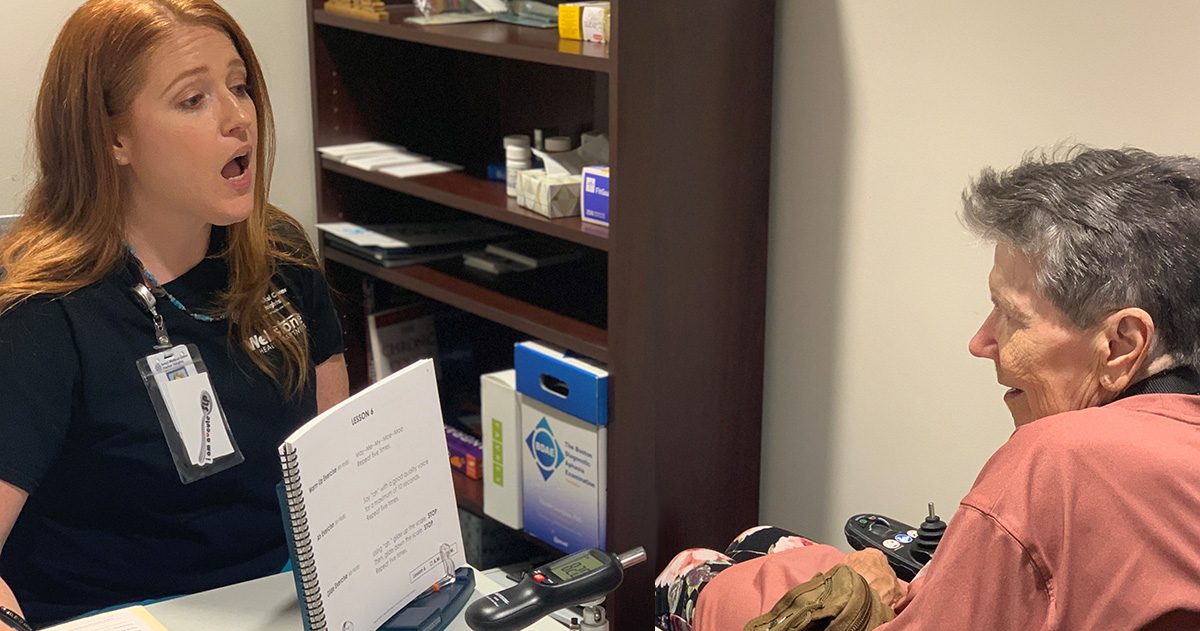Speech-language pathologists help people find their voice again
May is Better Hearing and Speech Month, a time when we should consider how much our hearing and speech abilities impact our daily lives.
We’ve asked Diana White, MS, CCC-SLP, a speech-language pathologist with Seton Medical Center Harker Heights (SMCHH) to explain her work for our patients.
“Most people I’ve met have never even heard of a speech-language pathologist (SLP),” said Diana, “so I like to use this month to advocate for communication and swallowing disorders, common, treatable disorders that can affect anyone of any age.”
She went on to explain that speech-language pathologists help people to think, communicate and eat — three areas that are critical to a person’s well-being and quality of life. We often take these abilities for granted until something happens to make thinking, communicating or eating difficult, which can have a profound effect on a person.
“Here at SMCHH, I evaluate and treat acute care patients, perform outpatient swallow studies with radiology and see patients at our outpatient clinic at the Armed Services YMCA. This allows me to work with people sometimes from the onset of their diagnosis to completion of their treatment, as well as getting to work with a variety of diagnoses such as voice disorders, stuttering, swallowing disorders and speech and language disorders.”
A speech-language pathologist treats patients with many different problems, including the following:
Speech — People with speech problems may not say sounds clearly or smoothly. This may make it difficult for others to understand them.
Language — A person with a language disorder may have problems with expressing themselves, understanding others and reading and/or writing.
Cognition — This condition can involve difficulties with attention, memory, problem-solving abilities, organizational skills and judgment.
Voice — Hoarseness, breathiness, pain, frequent coughing and other problems with a person’s voice may result from medical problems or from overuse or misuse. Certain professions, such as teachers, musicians and coaches, are at greater risk for these problems
Augmentative and Alternative Communication — People may need to use other ways to communicate besides talking. These include no- or low-tech and high-tech options such as pointing or gesturing, using picture boards and using speech-generating devices.
Feeding and Swallowing — Difficulties may include coughing or gagging during meals, food or liquid leaking from the mouth, or food getting stuck in the mouth or throat. These difficulties may occur due to preterm birth, developmental disabilities, medical conditions, illness and injury.
Gender-Affirming Voice and Communication — This area may involve problems that affect pitch, tone, vocal health, nonverbal communication and more.
Communication Coaching — Some SLPs help with public speaking and communication style, which may include learning another accent.
“What I love most about my job is helping people,” Diana said. “Helping them find their voice again, communicate better with loved ones, and to be able to eat and drink again makes my life’s work very rewarding.”
If you or someone you know is having difficulties in any of the above areas, they should contact their doctor and ask for a referral to be evaluated by a speech-language pathologist. To learn more about speech, language, and swallowing disorders, visit the American Speech-Language-Hearing Association’s website.



